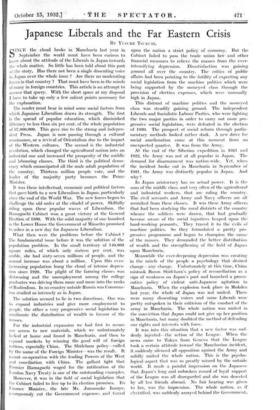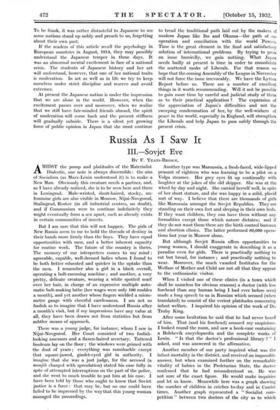Japanese Liberals and the Far Eastern Crisis
By YUSUKE TSURUSII.
SINCE the cloud broke in Manchuria last year in September the world must have been curious to know about the attitude of the Liberals in Japan towards the wholematter. So little has been told about this part of the story. Has there not been a single dissenting voice. in Japan over the whole issue ? Are there no moderating forces in that county ? That must have been in the minds of many in foreign countries. This article is an attempt to answer that query. With the short space at my disposal I have to take up only a few salient-points necessary for the explanation.
The reader must bear in mind some social factors from which Japanese Liberalism draws its strength. The first is the spread of popular education, which diminished illiteracy to leSs than six per cent. of the whole population of 67,000,000. This gave rise to the strong and indepen- dent Press. Japan is now passing through a cultural renaissance, or a revival of Orientalism due to the impact of the Western cultures. The second is the industrial revolution, which changed the agricultural nation into an industrial one and increased the prosperity of the middle and labouring classes. The third is the political demo- cracy which emancipated all the male adult population of the country. Thirteen million people vote, and the leader of the majority party becomes the Prime Minister.
It was theSe intellectual, economic and political factors that gave birth to a new Liberalism in Japan, particularly. since the-end of the World War. The new forces began to challenge" the' old order at the citadel of power. Skilfully riding upon these popular waves of Liberalism, the Hamaguchi Cabinet won a great victory at the General Election Of 1930. With the solid majority of one hundred in the LoWer House the Government of Minseito promised to usher in a new day for 'Japanese Liberalisni.
What then were the problems before the Cabinet ? The fundarnental issue before it was the solution of the population problem. In the small territory of 140,000 square miles, of which only sixteen per cent. was arable; -she had sixty-seven millions of people, and the annual increase was about a million. Upon this ever- increasing population hung the cloud of intense depres- sion since 1920. The plight of the farming classes was distressing and the unemployment among the college graduates was driving them more and more into the ranks of Radicalism. In no country outside Russia was Commun- ism studied so intensely as in Japan.
The solution seemed to lie in two directions. One was to expand industries and give more employment to people, the other a very progressive social legislation to ameliorate the distribution of wealth in favour of the masses.
For the industrial expansion we bad first to secure our access to raw materials, which we unfortunately lacked at home and found in Manchuria, and then to expand markets by winning the good will of foreign nations, especially China. The Shidehara policy—called by the name of the Foreign Minister—was the result. It meant co-operation with the_leading Powers of the West and conciliation with China. . The gallant fight that Premier Hamaguehi -waged for the ratification of the London Navy Treaty is_one of the outstanding examples.
However, it was in the field of social legislation that the Cabinet failed to live up to its election promises. Its Finance- Minister,.: the late . Mr; :Junnosuke Inouye, eoumgeoftsly rat the Goveniment .expenses and. forced upon the nation a strict ,policy of, economy. But the Cabinet failed to pass the trade union law and other financial measures to relieve the masses from the ever- intensifying depression. Dissatisfaction was gaining ground all over the country. The critics of public affairs had been pointing, to the futility of expecting any social legislation from the machine politics which were being supported by the moneyed class through the provision of election expenses, which were unusually high in Japan.
This distrust of machine politics and the moneyed class was steadily gaining ground. The independent Liberals and Socialistic Labour Parties, who were fighting the two major parties in order to carry out more pro- gressive social legislation, were defeated in the election of 1930. The prospect of social reform through parlia- mentary methods looked rather dark. A new drive for social amelioration came at this moment from an unexpected quarter. It was from the Army.
At the end of the Siberian expedition in 1921 and 1922, the Army was not at all popular in Japan. The demand for disarmament was nation-wide. Yet, when the incident broke out in Manchuria in September of 1931, the Army was distinctly popular in Japan. And why?
In Japan aristocracy has no actual power. It is the sons_ of the middle class, and very often of the agricultural and industrial workers, that arc ruling the country. The civil servants and Army and Navy officers are all recruited from these classes. It was these Army officers that had been studying the rural districts of the country whenee the soldiers were drawn, that had gradually. become aware of the social injustices heaped upon the hard-Working peasants.' They traced it to the evils of machine politics. So they formulated a pretty pro- gressive programme and began to champion the 'cause of the masses. They demanded the better distribution of wealth and the strengthening of the hold of Japan upon Manchuria.
Meanwhile the ever-deepening depression was creating in the minds of the people a psyChology that desired change—any change. Unfortunately at this time,. China mistook Baron Shidehara's policy of reconciliation as a sign of weakness on Japan's part and launched a provo- cative policy of violent anti-Japanese agitation in Manchuria. When the explosion. took place in Mukden w last year, the whole of Japan was not united. There were many dissenting voices and some Liberals were pretty outspoken in their criticism of the conduct of the army in Manchuria. The whole nation was united in the conviction that Japan could not give up her position in Manchuria, but many doubted the method of defending our rights and interests with force.
It was into this situation that a new factor was sud- denly injected—the action of the League. When the news came to Tokyo from Geneva that the League took a certain attitude toward the Manchurian incident,. it suddenly silenced all opposition against the Army and solidly united the whole nation. This is the psycho- logical aspect that was so greatly missed by the outside world. It made a painful impression on the Japanese that Japan's long and unbroken record of loyal support of the League was all disregarded and she was deserted by all her friends abroad. No fair hearing was given to. her, was. the impression. The whole nation, as if electrified, was suddenly arrayed behind the Government._ To be frank, it was rather distasteful to Japanese to see some nations stand up nobly and preach to us, forgetting about their own past.
If the readers of this article recall the psychology in European countries in August, 1914, they may possibly- understand the Japanese temper in these days. It was an abnormal mental excitement in face of a national' crisis. The students of Japanese history and her art will understand, however, that one of her national traits is moderation. In art as well as in life we try to keep ourselves under strict discipline and reserve and avoid extremes.
At present the Japanese nation is under the impression that we are alone in the world. However, when the excitement passes over and moreover, when we realize that we still have fair-minded friends abroad, the spirit of moderation will come back and the present stiffness will gradually subside. There is a silent yet growing force of public opinion in Japan that she must continue to tread the traditional path laid out by the makers of modern Japan like Ito and Okuma—the path of co. operation and conciliation with the world 'Powers. Time is the great element in the _ final and satisfactory solution of international problems. By trying to press an issue hurriedly, we gain nothing. What Japan needs badly at present is time in order to consolidate the scattered ranks of Liberals. For that reason we hope that the coming Assembly of the League in November will not force the issue irrevocably. We have the Lytton Report before us. There are a number of excellent things in it worth recommending. Will it not be possible to gain more time by careful and judicial study of them as to their practical application ?. The expression of the appreciation of Japan's difficulties and not the sweeping condemnation of her, by the well-wishers of peace in the world, especially in England, will strengthen' the Liberals and help Japan to pass safely through the present crisis.



























































 Previous page
Previous page